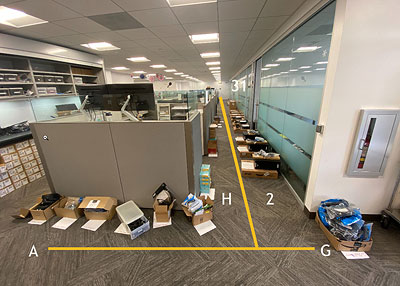Connect
How Did WGAW Staff Transition to Remote Work? Thank the IT Department.

IT Department organized equipment for contactless pick-up by staff.
The WGAW’s IT Department has been doing some heavy lifting since Guild employees began working remotely in mid-March, shortly before CA Gov. Gavin Newsom enacted statewide stay-at-home orders. With Guild employees working every day to support more than 10,000 members, shifting the vast majority of staff from working at the WGAW’s West Hollywood headquarters to working remotely from home was no easy task. IT spoke with Connect about what the transition has been like, and how writers can stay cyber safe while working from home.
How did the IT Department respond to the immediate need to transition staff to remote work?
There were two primary challenges: getting everyone the equipment that they needed to work remotely, and helping everyone to work online.
The week before quarantine was announced, we began the process of factory resetting older desktop computers that had been decommissioned and started ordering extra equipment that we thought staff would likely need. This got complicated quickly and we had to get creative, as procuring IT equipment started becoming only slightly easier than acquiring toilet paper. We transformed the IT room into a mini-warehouse and worked out a system with the security team to arrange for contactless fulfillment of hardware requests.
While many Guild employees were set up for remote work, most were not, and we anticipated a deluge of employee assistance requests. We shifted staff from other technical teams to assist our desktop support team and built spreadsheets to track the equipment that had been issued and where we were with each employee’s customer service requests.
How has the department adapted to support the operations of the Guild since then?
Our desktop team has had to make much more extensive use of remote assistance tools than we normally do. Most IT work does not require physical presence and aside from the impacts of extra staff support, the quarantine has had minimal impact on our day-to-day operations.
What cyber security tips would you give members, as more are working from home?
Please be extra careful to not fall for phishing campaigns or work-from-home scams. The government and your financial institutions are not likely to be sending you emails asking you to confirm your passwords, bank account numbers, social security numbers, etc. If you are working from a computer that you normally do not use, make sure it is protected with up-to-date antivirus software.
